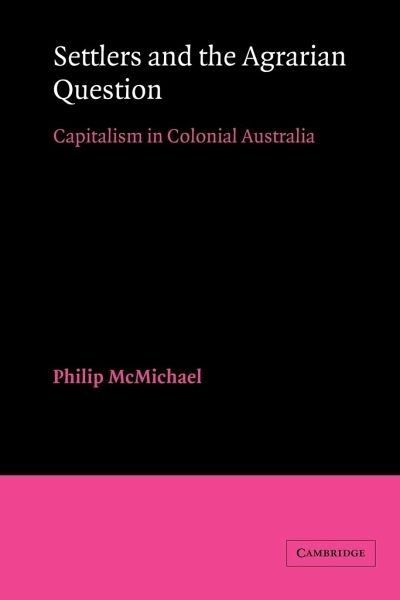
Settlers and the Agrarian Question
Capitalism in Colonial Australia
Versandkostenfrei!
Versandfertig in 1-2 Wochen
43,99 €
inkl. MwSt.

PAYBACK Punkte
22 °P sammeln!
An original interpretation of the development of Australian colonial society and economy.This book traces the formation of Australian colonial society and economy within the context of the changing fortunes of British hegemony in the nineteenth-century world economy. Australia's transition from conservative origins as a penal colony supporting a grazier class oriented to export production, to liberal agrarian capitalism, was not a simple reflex of imperial setting. Domestically, the 'agrarian question' - who should control the land and to what end? - was the central political struggle of this ...
An original interpretation of the development of Australian colonial society and economy.
This book traces the formation of Australian colonial society and economy within the context of the changing fortunes of British hegemony in the nineteenth-century world economy. Australia's transition from conservative origins as a penal colony supporting a grazier class oriented to export production, to liberal agrarian capitalism, was not a simple reflex of imperial setting. Domestically, the 'agrarian question' - who should control the land and to what end? - was the central political struggle of this period, as urban-commercial forces contested the graziers' monopoly, of the landed economy. Embedded in the conflict among settler classes was an international dimension, involving a juxtaposition of laissez-faire and mercantilist phases of British political economy. Professor McMichael argues that the transition from a patriarchal wool-growing colony to a liberal-nationalist form of capitalist development is best understood through a systematic analysis of the effect of the imperial politicoeconomic relationship on the social and political forces within nineteenth-century Australia.
Table of content:
Map of Australia; List of tables; Preface; 1. The social structure of British hegemony; Part I. The Colonial Economy Enters the World Market (1788-1830): 2. The transition from penal to commercial colony; 3. The world-economic origins of colonial wool growing; Part II. The Squatting Phase of Pastoralism (1830s and 1840s): 4. Squatting and colonial politics; 5. Merchants and growers; 6. Pastoral enterprise in the colonial economy; 7. The conservative character of pastoralism; Part III. Confronting the Agrarian Question (1840-1900): 8. The 1840s crisis and social transition; 9. Foundations of the agrarian question; 10. State formation and transformation of the landed economy; Conclusion; Appendixes; References; Index.
This book traces the formation of Australian colonial society and economy within the context of the changing fortunes of British hegemony in the nineteenth-century world economy. Australia's transition from conservative origins as a penal colony supporting a grazier class oriented to export production, to liberal agrarian capitalism, was not a simple reflex of imperial setting. Domestically, the 'agrarian question' - who should control the land and to what end? - was the central political struggle of this period, as urban-commercial forces contested the graziers' monopoly, of the landed economy. Embedded in the conflict among settler classes was an international dimension, involving a juxtaposition of laissez-faire and mercantilist phases of British political economy. Professor McMichael argues that the transition from a patriarchal wool-growing colony to a liberal-nationalist form of capitalist development is best understood through a systematic analysis of the effect of the imperial politicoeconomic relationship on the social and political forces within nineteenth-century Australia.
Table of content:
Map of Australia; List of tables; Preface; 1. The social structure of British hegemony; Part I. The Colonial Economy Enters the World Market (1788-1830): 2. The transition from penal to commercial colony; 3. The world-economic origins of colonial wool growing; Part II. The Squatting Phase of Pastoralism (1830s and 1840s): 4. Squatting and colonial politics; 5. Merchants and growers; 6. Pastoral enterprise in the colonial economy; 7. The conservative character of pastoralism; Part III. Confronting the Agrarian Question (1840-1900): 8. The 1840s crisis and social transition; 9. Foundations of the agrarian question; 10. State formation and transformation of the landed economy; Conclusion; Appendixes; References; Index.




